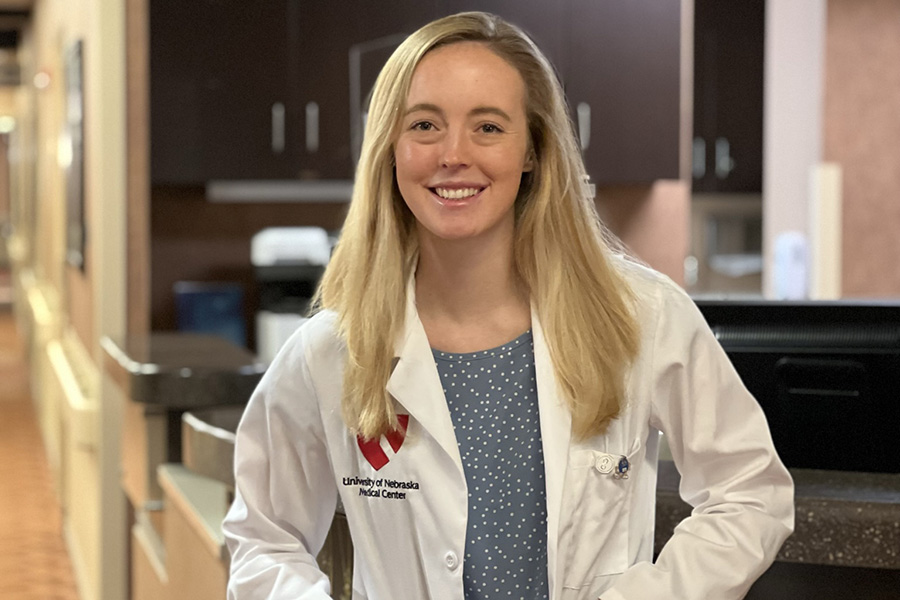Shea Jeffres, a third-year student in the UNMC College of Medicine, has wanted to be a doctor since she was 5 years old.
She started announcing it then, to her father, a rancher, and her mother, a teacher. They told her she could do anything she dreamed. So she tucked that dream in her pocket and made it into medical school.
When she got to UNMC, however, Jeffres, from Burwell, Nebraska, wasn’t as prepared as she thought. She looked around and noticed that the students from urban areas simply knew more about health care than she did.
Burwell is a town of 1,091 people, 86 miles north of Kearney in north-central Nebraska.
“I’m from the middle of nowhere,” Jeffres said.
So to help other students facing a similar challenge, Jeffres and four other medical students last spring started Nebraska Rural Health Outreach. The program’s focus is to provide information and resources to high school students from rural Nebraska who are interested in a career in health care but don’t know exactly how to pursue it.
In rural parts of Nebraska and other states, there simply isn’t a lot of exposure to the various health care professions, said Jeffres, the inaugural president of the new outreach program.
“A lot of high school students in rural Nebraska simply don’t know the careers out there in medicine,” she said. “They might like science and math. They might see a doctor, a dentist, a pharmacist, or maybe a physical therapist in their town, but those roles are pretty basic. Many don’t have family members in medicine, so they don’t know how to start the process of getting into health care.”
The program has members from each of UNMC’s colleges. Each month, the 60-plus UNMC students host a Zoom meeting with students from as many as 13 rural Nebraska high schools. During the meeting, the high school students hear from a health care professional.
“They themselves also grew up in rural Nebraska and are now practicing,” Jeffres said. “Most have gone through UNMC’s program. They all have different paths to medicine and offer valuable insight.”
Another piece of the program is mentorship. High school students can apply for a mentor in an area of health care that interests them, and a UNMC student in that program will sign on to be their mentor. About 10 students have signed up for a mentor so far, Jeffres said.
In addition to teaching about the different possible health care paths, Jeffres said, her group aims to help young people understand the process, too. For instance, some students don’t know how much education is involved in a career in health care.
“When you’re 17 years old, you don’t necessarily know that process. It’s been insightful for the kids,” she said.
Also instrumental in starting the program were medical students Lesley Towery of Wauneta, Nebraska; Nicole Beckman of Elgin, Nebraska; Kelsey Green of Neligh, Nebraska; and Lafe Loper of Callaway, Nebraska. The group’s faculty advisor is Jennifer Parker, MD.
Said Dr. Parker: “This program will hopefully inspire students who may not have mentors or much exposure to health care to consider a broad range of possible health care career options.”
This new program ties in with existing initiatives to help rural residents interested in careers in health care. For example, the Rural Health Opportunities Program (RHOP) and Kearney Health Opportunities Program (KHOP) are cooperative programs between the Nebraska State Colleges, the University of Nebraska at Kearney and the University of Nebraska Medical Center. The health professions pathway programs recruit, educate and graduate leaders from Nebraska who are committed to returning to Nebraska’s rural areas to practice health care. Students are able to apply and enroll in one of 10 participating UNMC programs.
As for Jeffres, she plans to be a surgeon. And if she can do it, she wants young people from rural areas around the state to know that they can, too.
“I can’t start a curriculum for these high school students, but I am qualified to share my experiences and find other people who had similar experiences,” she said. “If medicine is something you want to do, you can do it. Rural Nebraska’s not going to hold you back.”
